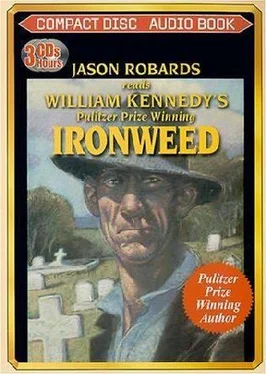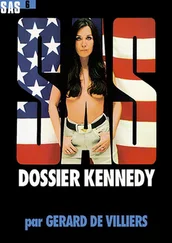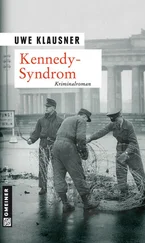William Kennedy - Ironweed
Здесь есть возможность читать онлайн «William Kennedy - Ironweed» весь текст электронной книги совершенно бесплатно (целиком полную версию без сокращений). В некоторых случаях можно слушать аудио, скачать через торрент в формате fb2 и присутствует краткое содержание. Жанр: Современная проза, на английском языке. Описание произведения, (предисловие) а так же отзывы посетителей доступны на портале библиотеки ЛибКат.
- Название:Ironweed
- Автор:
- Жанр:
- Год:неизвестен
- ISBN:нет данных
- Рейтинг книги:3 / 5. Голосов: 1
-
Избранное:Добавить в избранное
- Отзывы:
-
Ваша оценка:
- 60
- 1
- 2
- 3
- 4
- 5
Ironweed: краткое содержание, описание и аннотация
Предлагаем к чтению аннотацию, описание, краткое содержание или предисловие (зависит от того, что написал сам автор книги «Ironweed»). Если вы не нашли необходимую информацию о книге — напишите в комментариях, мы постараемся отыскать её.
Ironweed — читать онлайн бесплатно полную книгу (весь текст) целиком
Ниже представлен текст книги, разбитый по страницам. Система сохранения места последней прочитанной страницы, позволяет с удобством читать онлайн бесплатно книгу «Ironweed», без необходимости каждый раз заново искать на чём Вы остановились. Поставьте закладку, и сможете в любой момент перейти на страницу, на которой закончили чтение.
Интервал:
Закладка:
There are things I never wanted to learn how to do, is one thought that came to Francis.
And there are things I did without needin’ to learn.
And I never wanted to know about them either.
Francis’s hands, as he looked at them now, seemed to be messengers from some outlaw corner of his psyche, artificers of some.involuntary doom element in his life. He seemed now to have always been the family killer; for no one else he knew of in the family had ever lived as violently as he. And yet he had never sought that kind of life.
But you set out to kill me , Harold Allen said silently from the back.of the wagon.
“No,” answered Francis without turning. “Not kill anybody. Just do some damage, get even. Maybe bust a trolley window, cause a ruckus, stuff like that.”
But you knew, even that early in your career, how accurate your throw could be. You were proud of that talent. It was what you brought to the strike that day, and it was why you spent the morning hunting for stones the same weight as a baseball. You aimed at me to make yourself a hero.
“But not to kill you.”
Just to knock out an eye, was it?
Francis now remembered the upright body of Harold Allen on the trolley, indisputably a target. He remembered the coordination of vision with arm movement, of distance with snap of wrist. For a lifetime he had remembered precisely the way Harold Allen crumpled when the stone struck his forehead at the hairline. Francis had not heard, but had forever after imagined, the sound the stone (moving at maybe seventy miles an hour?) made when it hit Harold Allen’s skull. It made the skull sound as hollow, as tough, and as explodable, he decided, as a watermelon hit with a baseball bat.
Francis considered the evil autonomy of his hands and wondered what Skippy Maguire, in his later years, had made of his own left hand’s suicidal impulse. Why was it that suicide kept rising up in Francis’s mind? Wake up in the weeds outside Pittsburgh, half frozen over, too cold to move, flaked out ‘n’ stiffer than a chunk of old iron, and you say to yourself: Francis, you don’t ever want to put in another night, another mornin’, like this one was. Time to go take a header off the bridge.
But after a while you stand up. wipe the frost out of your ear, go someplace to get warm, bum a nickel for coffee, and then start walkin’ toward somewheres else that ain’t near no bridge.
Francis did not understand this flirtation with suicide, this flight from it. He did not know why he hadn’t made the big leap the way Helen’s old man had when he knew he was done in. Too busy, maybe, figurin’ out the next half hour. No way for Francis ever to get a real good look past the sunset, for he’s the kind of fella just kept runnin’ when things went bust; never had the time to stop anyplace easy just to die.
But he never wanted to run off all that much either. Who’d have figured his mother would announce to the family at Thanksgiving dinner, just after Francis married Annie, that neither he nor his common little woman would ever be welcome in this house again? The old bat relented after two years and Francis was allowed visiting privileges. But he only went once, and not even inside the door then, for he found out that privileges didn’t extend to most uncommon Annie at his side.
And so family contact on Colonie Street ended for Francis in a major way. He vacated the flat he’d rented nine doors up the block, moved to the North End to be near Annie’s family, and never set foot again in the goddamned house until the old battle-ax (sad, twisted, wrongheaded, pitiable woman) died.
Departure.
Flight of a kind, the first.
Flight again, when he killed the scab.
Flight again, every summer until it was no longer possible, in order to assert the one talent that gave him full and powerful ease, that let him dance on the earth to the din of brass bands, raucous cheers, and the voluptuous approval of the crowd. Flight kept Francis sane during all those years, and don’t ask him why. He loved living with Annie and the kids, loved his sister, Mary, and half-loved his brothers Peter and Chick and his moron brother, Tommy, too, who all came to visit him at his house when he was no longer welcome at theirs.
He loved and half-loved lots of things about Albany.
But then one day it’s February again,
And it won’t be long now till the snow gets gone again,
And the grass comes green again,
And then the dance music rises in Francis’s brain,
And he longs to flee again,
And he flees.
o o o
A man stepped out of a small apartment house behind Sacred Heart Church and motioned to Rosskam, who reined the horse and climbed down to negotiate for new junk. Francis, on the wagon, watched a group of children coming out of School 20 and crossing the street. A woman whom Francis took to be their teacher stood a few steps into the intersection with raised hand to augment the stopping power of the red light, even though there were no automobiles in sight, only Rosskam’s wagon. which was already standing still. The children, their secular school day ended, crossed like a column of ants into the custody of two nuns on the opposite corner, gliding black figures who would imbue the pliant young minds with God’s holy truth: Blessed are the meek. Francis remembered Billy and Peg as children, similarly handed over from the old school to this same church for instruction in the ways of God, as if anybody could ever figure that one out.
At the thought of Billy and Peg, Francis trembled. He was only a block away from where they lived. And he knew the address now, from the newspaper. I’ll come by of a Sunday and bring a turkey, Francis had told Billy when Billy first asked him to come home. And Billy’s line was: Who the fuck wants a turkey? Yeah, who does? Francis answered then. But his answer now was: I sorta do.
Rosskam climbed back on the wagon, having made no deal with the man from the apartment house, who wanted garbage removed.
“Some people,” said Rosskam to the rear end of his horse, “they don’t know junk. It ain’t garbage. And garbage, it ain’t junk.”
The horse moved forward, every clip clop of its hooves tightening the bands around Francis’s chest. How would he do it? What would he say? Nothing to say. Forget it. No, just knock at the door. Well, I’m home. Or maybe just: How’s chances for a cupacoffee; see what that brings. Don’t ask no favors or make no promises. Don’t apologize. Don’t cry. Make out it’s just a visit. Get the news, pay respects, get gone.
But what about the turkey?
“I think I’m gonna get off the wagon up ahead a bit,” Francis told Rosskam, who looked at him with a squinty eye. “Gettin’ near the end of the day anyway, ‘bout an hour or so left before it starts gettin’ dark, ain’t that right?” He looked up at the sky, gray but bright, with a vague hint of sun in the west.
“Quit before dark?” Rosskam said. “You don’t quit before dark.”
“Gotta see some people up ahead. Ain’t seen ‘em in a while.”
“So go.”
“‘Course I want my pay for what I done till now.”
“You didn’t work the whole day. Come by tomorrow, I’ll figure how much.”
“Worked most of the day. Seven hours, must be, no lunch.”
“Half a day you worked. Three hours yet before dark.”
“I worked more’n half a day. I worked more’n seven hours. I figure you can knock off a dollar. That’d be fair. I’ll take six ‘stead of seven, and a quarter out for the shirt. Five-seventy-five.”
“Half a day you work, you get half pay. Three-fifty.”
“No sir.”
“No? I am the boss.”
“That’s right. You are the boss. And you’re one strong fella too. But I ain’t no dummy, and I know when I’m bein’ skinned. And I want to tell you right now, Mr. Rosskam, I’m mean as hell when I get riled up.” He held out his right hand for inspection. “If you think I won’t fight for what’s mine, take a look. That hand’s seen it all. I mean the worst. Dead men took their last ride on that hand. You get me?”
Читать дальшеИнтервал:
Закладка:
Похожие книги на «Ironweed»
Представляем Вашему вниманию похожие книги на «Ironweed» списком для выбора. Мы отобрали схожую по названию и смыслу литературу в надежде предоставить читателям больше вариантов отыскать новые, интересные, ещё непрочитанные произведения.
Обсуждение, отзывы о книге «Ironweed» и просто собственные мнения читателей. Оставьте ваши комментарии, напишите, что Вы думаете о произведении, его смысле или главных героях. Укажите что конкретно понравилось, а что нет, и почему Вы так считаете.












